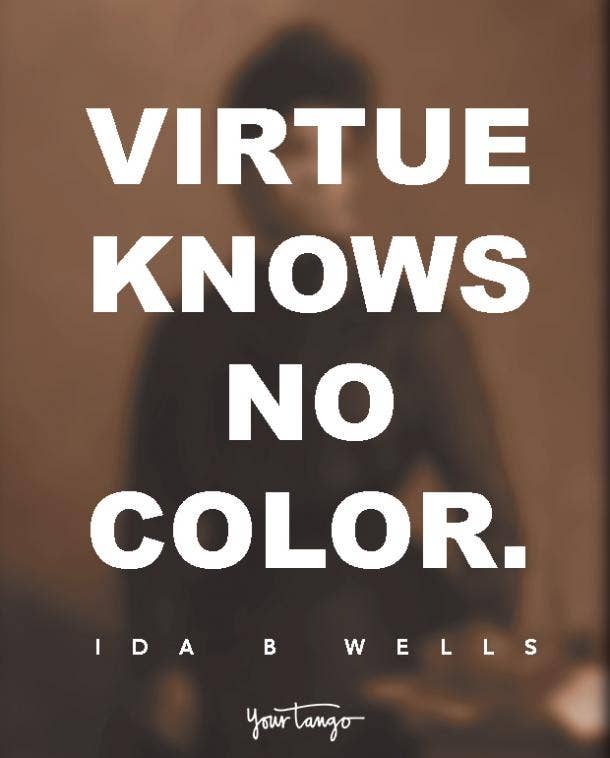50 Best Ida B. Wells Quotes About Racism, Feminism And Activism
Words from a powerful woman.
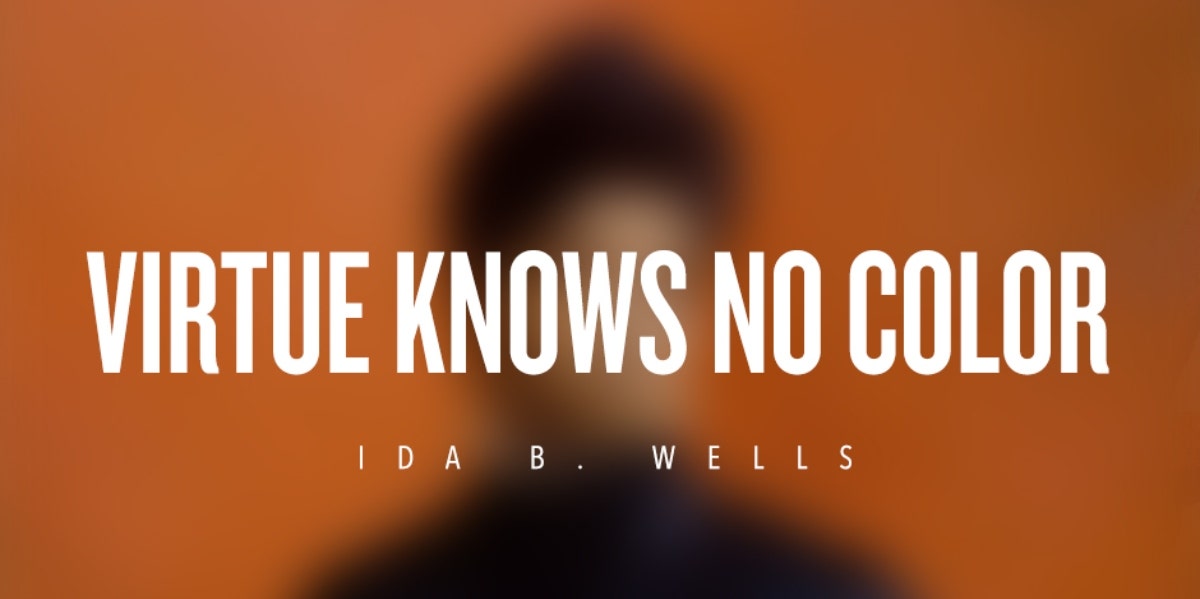 YourTango
YourTango Ida B. Wells was a Civil Rights activist, feminist, suffragist, and journalist.
Born into a slave family in 1862, she was already aware of the mistreatment of black people in America at a young age.
She knew that if she did nothing to try to voice her opinion on the abuse of African Americans while she had the chance, it would only make it harder for future generations to stand up for themselves.
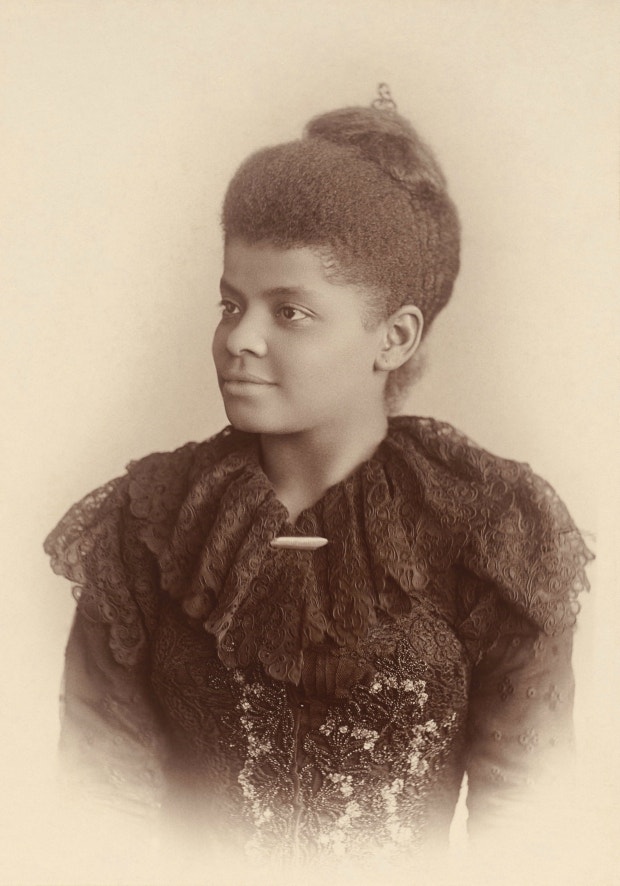 Photo: Wikipedia
Photo: Wikipedia
And Wells did more than just voice her opinion.
Thanks to her, black-founded organizations were created and people became more aware of the racism that was going on at the time, leading to a better insight into was happening to the black population in America; not just in the South, but everywhere.
Wells — also a women’s rights activist — helped form the Republican Women’s Club in Illinois so that women could be granted the right to vote and hold office, as well as created the National Association of Colored Women to bring rights to black women.
It’s important to celebrate Ida B. Wells for everything she accomplished.
Read below to find some of the most inspiring Ida B. Wells quotes as we celebrate someone who has made a huge impact on American history.
Inspirational Ida B. Wells Quotes
1. "I’d rather go down in history as one lone Negro who dared to tell the government that it had done a dastardly thing than to save my skin by taking back what I said."
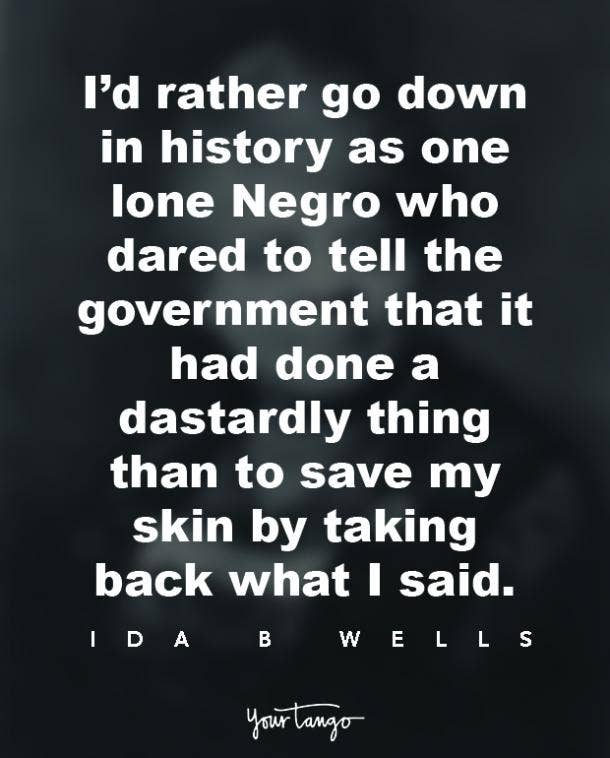
2. “A Winchester rifle should have a place of honor in every black home, and it should be used for that protection which the law refuses to give.”
3. “In slave times the Negro was kept subservient and submissive by the frequency and severity of the scourging, but, with freedom, a new system of intimidation came into vogue; the Negro was not only whipped and scourged; he was killed.”
4. “Eternal vigilance is the price of liberty, and it does seem to me that notwithstanding all these social agencies and activities there is not that vigilance which should be exercised in the preservation of our rights.”
5. "The Afro-American is not a bestial race. If this work can contribute in any way toward proving this, and at the same time arouse the conscience of the American people to a demand for justice to every citizen, and punishment by law for the lawless, I shall feel I have done my race a service."
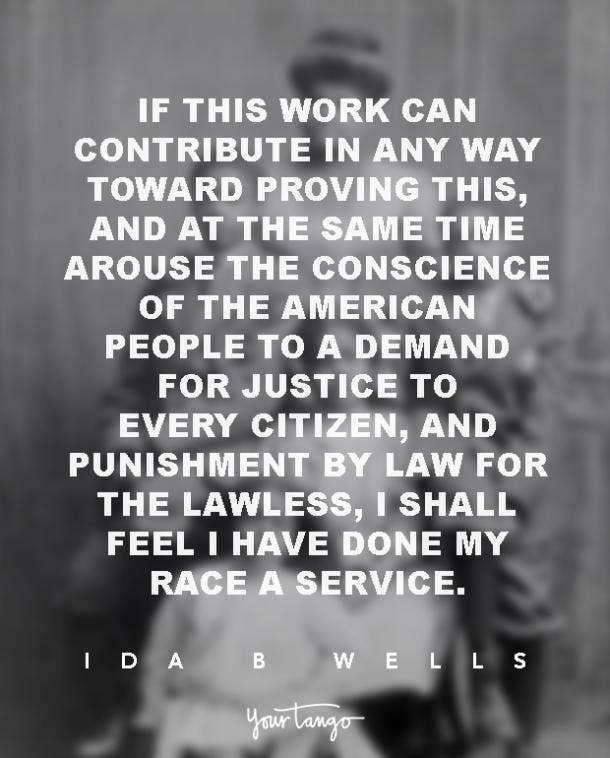
6. “There can be no possible belief that these people were inspired by any consuming zeal to vindicate God’s law against miscegenationists of the most practical sort. The woman was a willing partner in the victim’s guilt, and being of the 'superior' race must naturally have been more guilty.”
7. “What becomes a crime deserving capital punishment when the tables are turned is a matter of small moment when the negro woman is the accusing party.”
8. "Virtue knows no color."
9. “The appeal to the white man's pocket has ever been more effectual than all the appeals ever made to his conscience.”
10. “Virtue knows no color line, and the chivalry which depends upon complexion of skin and texture of hair can command no honest respect.”
11. “The nineteenth-century lynching mob cuts off ears, toes, and fingers, strips off flesh, and distributes portions of the body as souvenirs among the crowd.”
12. “Somebody must show that the Afro-American race is more sinned against than sinning, and it seems to have fallen upon me to do so.”
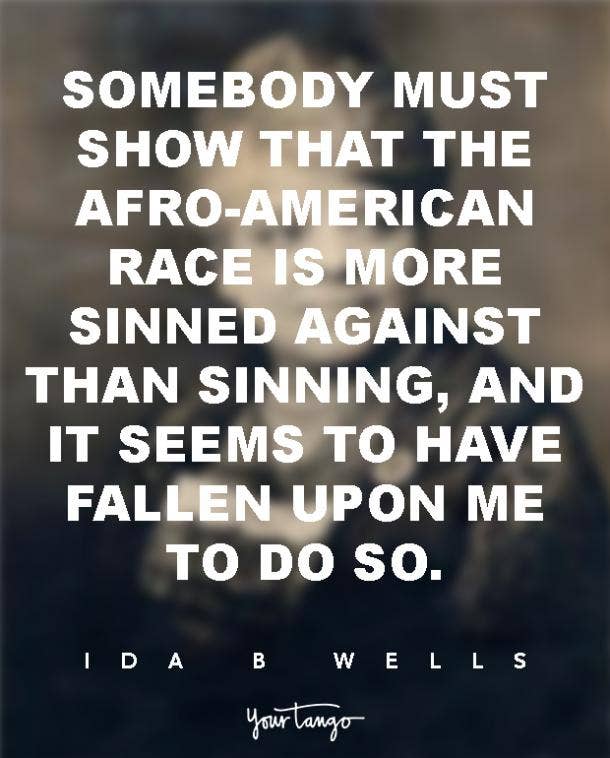
13. “Brave men do not gather by thousands to torture and murder a single individual, so gagged and bound he cannot make even feeble resistance or defense.”
14. “Although lynchings have steadily increased in number and barbarity during the last twenty years, there has been no single effort put forth by the many moral and philanthropic forces of the country to put a stop to this wholesale slaughter.”
15. “Treat the world well. It was not given to you by your parents but lent to you by your children.”
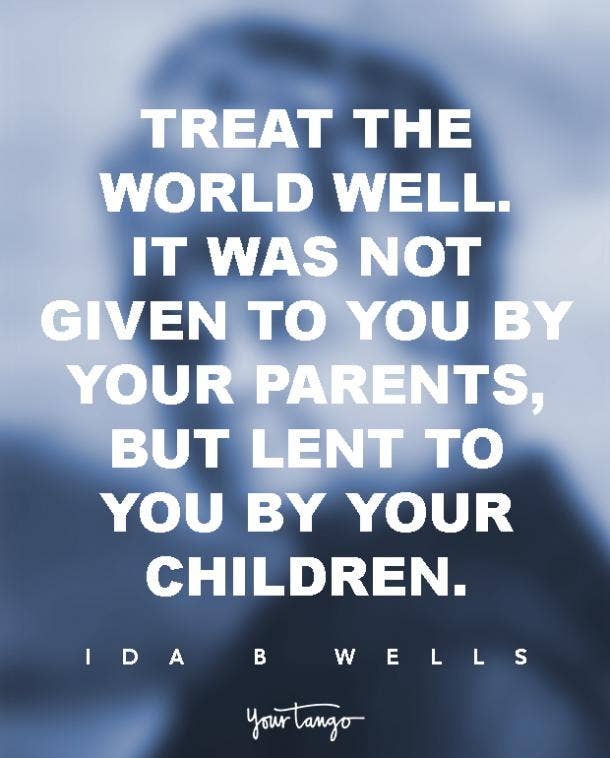
16. “The city of Memphis has demonstrated that neither character nor standing avails the Negro if he dares to protect himself against the white man or become his rival.”
17. “The doors of churches, hotels, concert halls and reading rooms are alike closed against the Negro as a man, but every place is open to him as a servant.”
18. “The South resented giving the Afro-American his freedom, the ballot box and the Civil Rights Law.”
19. “The matter came up for judicial investigation, but as might have been expected, the white people concluded it was unnecessary to wait the result of the investigation — that it was preferable to hang the accused first and try him afterward.”
20. “The white man’s victory soon became complete by fraud, violence, intimidation and murder.”
21. “The way to right wrongs is to turn the light of truth upon them.”
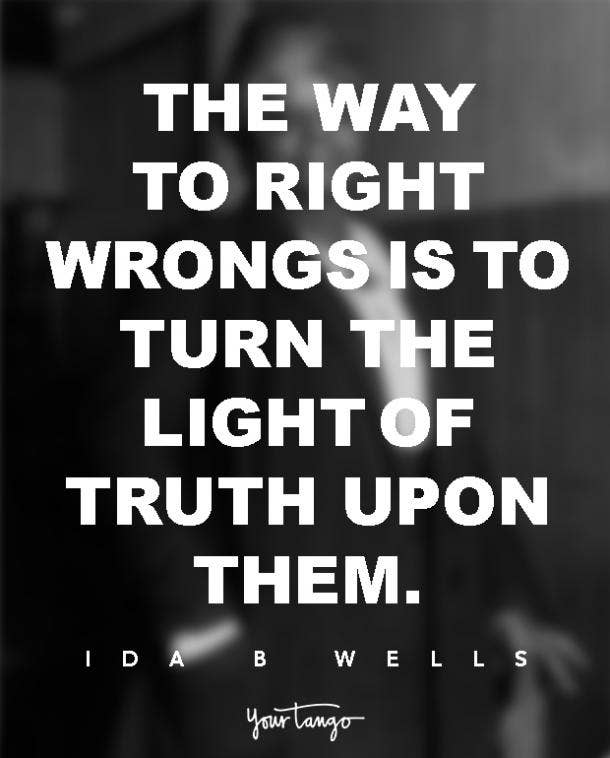
22. “I am only a mouthpiece through which to tell the story of lynching and I have told it so often that I know it by heart. I do not have to embellish; it makes its own way.”
23. “The negro has suffered far more from the commission of this crime against the women of his race by white men than the white race has ever suffered through his crimes.”
24. “Burning and torture here lasts but a little while, but if I die with a lie on my soul, I shall be tortured forever. I am innocent.”
25. “The mob spirit has grown with the increasing intelligence of the Afro-American.”
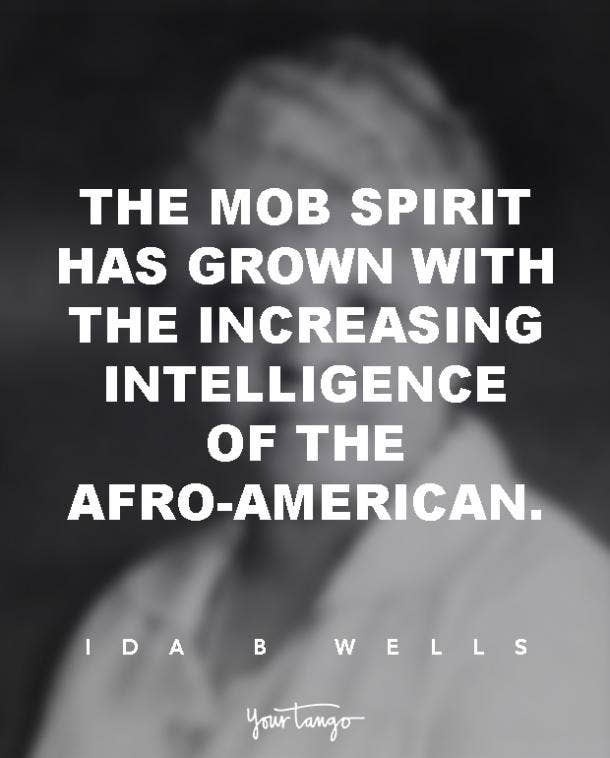
26. “The South is brutalized to a degree not realized by its own inhabitants, and the very foundation of government, law and order, are imperilled.”
27. “The alleged menace of universal suffrage having been avoided by the absolute suppression of the negro vote, the spirit of mob murder should have been satisfied and the butchery of negroes should have ceased.”
28. “There must always be a remedy for wrong and injustice if we only know how to find it.”
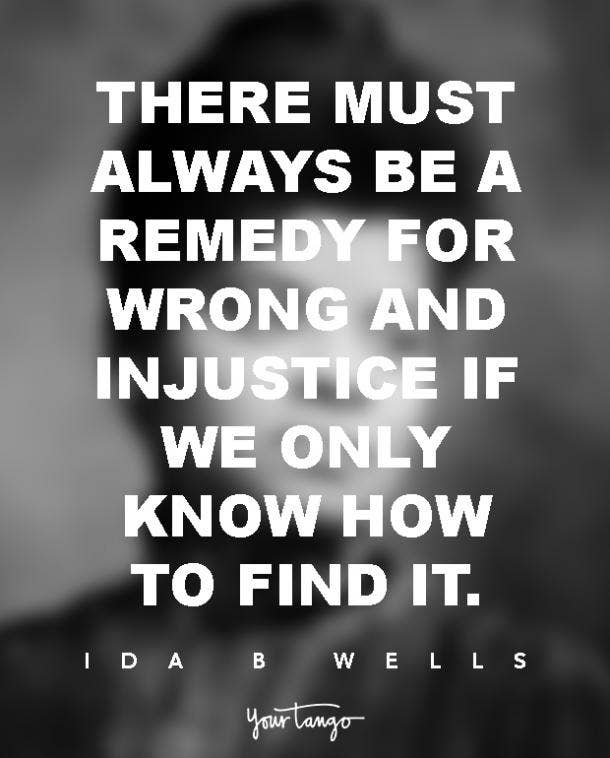
29. “No nation, savage or civilized, save only the United States of America, has confessed its inability to protect its women save by hanging, shooting, and burning alleged offenders.”
30. “If Southern white men are not careful, they will overreach themselves and public sentiment will have a reaction; a conclusion will then be reached which will be very damaging to the moral reputation of their women.”
31. “I honestly believe I am the only woman in the United States who ever traveled throughout the country with a nursing baby to make political speeches.”
32. “The appetite grows for what it feeds on.”
33. “I came home every Friday afternoon, riding the six miles on the back of a big mule. I spent Saturday and Sunday washing and ironing and cooking for the children and went back to my country school on Sunday afternoon.”
34. “I felt that one had better die fighting against injustice than to die like a dog or rat in a trap. I had already determined to sell my life as dearly as possible if attacked. I felt if I could take one lyncher with me, this would even up the score a little bit.”
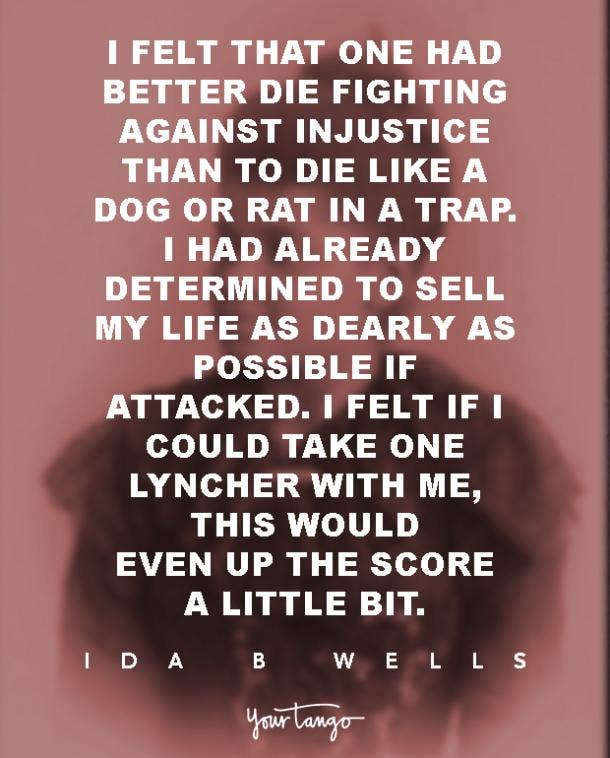
35. “When the white man who is always the aggressor knows he runs as great a risk of biting the dust every time his Afro-American victim does, he will have greater respect for Afro-American life. The more the Afro-American yields and cringes and begs, the more he has to do so, the more he is insulted, outraged and lynched.”
36. “In fact, for all kinds of offenses — and, for no offenses — from murders to misdemeanors, men and women are put to death without judge or jury; so that, although the political excuse was no longer necessary, the wholesale murder of human beings went on just the same.”
37. “It is extremely rough to follow through with my goals, but I felt a responsibility to show the world what the African Americans are facing through this rough patch.”
38. “The only times an Afro-American who was assaulted got away has been when he had a gun and used it in self-defense.”
39. “I had an instinctive feeling that the people who have little or no school training should have something coming into their homes weekly which dealt with their problems in a simple, helpful way... so I wrote in a plain, common-sense way on the things that concerned our people.”
40. “The people must know before they can act, and there is no educator to compare with the press.”
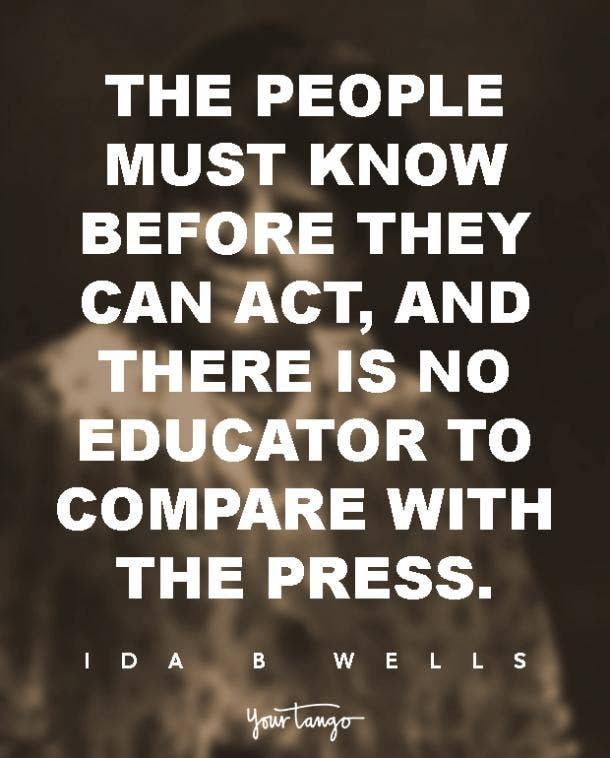
41. “In nearly all communities wife beating is punishable with a fine, and in no community is it made a felony.”
42. "The entire system of the judiciary of this country is in the hands of white people. To this add the fact of the inherent prejudice against colored people, and it will be clearly seen that a white jury is certain to find a Negro prisoner guilty if there is the least evidence to warrant such a finding."
43. "When I see the same enormities practiced upon beings whose complexion and blood claim kindred with my own, I curse the perpetrators, and weep over the wretched victims of their rapacity."
44. "Indeed, truth and justice demand from me the confession that the Christian slaves among the barbarians of Africa are treated with more humanity than the African slaves among the professing Christians of civilized America; and yet here sensibility bleeds at every pore for the wretches whom fate has doomed to slavery."
45. "Those who commit the murders write the reports."
46. “The government which had made the Negro a citizen found itself unable to protect him. It gave him the right to vote, but denied him the protection which should have maintained that right.”
47. “The white man’s dollar is his god, and to stop this will be to stop outrages in many localities.”
48. “During the slave regime, the Southern white man owned the Negro body and soul. It was to his interest to dwarf the soul and preserve the body.”
49. “The Afro-American is thus the backbone of the South.”
50. “Lynching is color-line murder.”
Emily Ratay is a full-time writer living in Pittsburgh. She's passionate about the environment and feminism and knows that anything is possible in the right pair of shoes.

